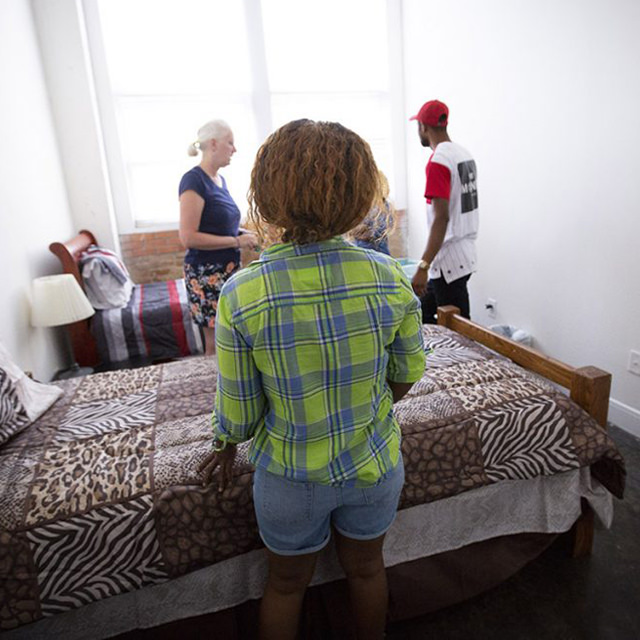
Asylum Seekers Find Solace in DASH Network founded by TCU Alumna
Fort Worth nonprofit provides housing as well as support and friendship for people fleeing persecution.
This article by Zach Martino was originally published in the spring issue of TCU Magazine.
Editor’s Note: Asylum-seekers most often are fleeing persecution in their native countries. Some of their names are withheld in this story to protect them as their court cases move through an immigration process that remains in flux.
On a Saturday morning in July, temperatures were in the mid-90s before noon in central Fort Worth. Volunteers with DASH Network started work early; weather forecasts predicted triple digits before sundown.
Weekends are move-in days for DASH Network, a nonprofit that serves the Dallas-Fort Worth area. On this particular day, the team of committed volunteers was bigger than usual — almost 20 people.
Operating with economy, most volunteers were on their fourth trip from the moving trucks, delivering small furniture, plastic boxes, utensils and other household supplies up the stairs to a fourth-floor apartment.
With the arrival of pickup trucks carrying large furniture, including mattresses strapped down in vehicle beds, the volunteers shifted gears. The first order of business: a three-cushion cloth couch. The cumbersome frame made the green-colored sofa impossible to carry up multiple floors. Standing upright, it narrowly fit in the building’s elevator.
The two-bedroom apartment with vaulted ceilings filled up fast. The couch was set down on an area rug amid end tables, clothes and household items. Each bedroom had two beds.
The furniture and household accessories were for four people who had fled their native countries to seek asylum in the United States.
As the volunteer movers walked through the front door, they asked the first two tenants to arrive — French-speaking twin sisters — polite questions. “Quel pays?” someone asked in French, translating into “Which country?”
With the conversation going slowly, the volunteers and the sisters turned to a former DASH resident from central Africa to translate. The volunteers needed to know the sisters’ preferences for where household things should go and where to place furniture.
The summer heat was rising, and two more asylum-seekers were waiting to move in.
The Housing
In 2012, Ashley Young Freeman ’09 started DASH (DFW Asylum-Seeker Housing) Network in Fort Worth. The nonprofit differs from other Dallas-Fort Worth area organizations in that it provides housing, in addition to other services, for asylum-seekers waiting for their work permits.
Asylum-seekers are not the same as refugees or migrants. Migrants move to a different country for economic reasons, while refugees and asylum-seekers have to flee for their safety. Services such as housing and resettlement aid are provided to refugees, who typically arrive in the U.S. after long waits in camps overseas. Asylum-seekers, who enter the country on their own, must find such help for themselves.
Without DASH Network in North Texas, asylum-seekers’ “only option was the homeless shelters, which were very dangerous places and not a program tailored to asylum-seekers,” said Freeman, board chairwoman of the growing nonprofit organization.
Read more in TCU Magazine.
